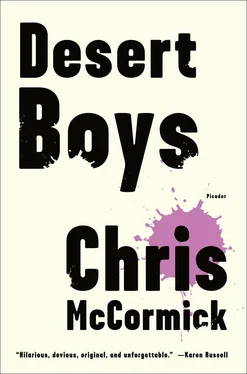Go along with the plan. Watch Lloyd open the garage door while you back the rental car out of the driveway into the street, making room for your father to back his car out of the garage. Join Lloyd there. Take note of how utterly full of boxes the garage has become, how the only free space is in the shape of your father’s car. Realize this is because your mother’s stuff has been added.
While your dad is in his car in the driveway, ask Lloyd quickly if he’s sure this is a good idea. And when Lloyd says looking for the play would make your father “probably happier than he’s been in a long while, Daley,” kiss him on the cheek. Think of the only time you met his parents, two years ago. You met at an expensive vegetarian restaurant in San Francisco. They were visiting from Denver, and Lloyd, an only child, called them by their first names. Remember the stilted conversation you had with Rayne, a ballet instructor, and Lloyd Senior, a lawyer. You knew they were paying Lloyd’s share of the rent, and this knowledge made you a bitter and unpleasant dinner guest. At the time, you didn’t feel as though you could be honest with your parents about your relationship with men. Your mother’s reaction, especially, concerned you. She was an immigrant, a devout Christian, and you feared her as much as you loved her, which is to say, as much as you’ve felt anything before or since. At dinner that night, you saw Lloyd’s friendliness with his parents, and you wondered enviously if money, the flow of it, served as some sort of conduit for their ease, and whether you might’ve been more honest with your parents if only there had been money — like a string between paper cups — keeping you tethered.
Return to the boxes. Begin unboxing. The three of you together can rummage through nine stacks of boxes per hour. No need to search through the top boxes — these are your mother’s things. Remind yourself that there is nothing for you to do with her clothes, her records, her wigs.
Drag the boxes you’ve already checked out to the driveway. When passersby slow down, anticipating a sale, wave them pleasantly along.
Find a strange box of clear liquor, and, because you’ve never known your father to be a drinker, ask about it. When he explains he’d been gifted the alcohol from your uncle Gaspar, examine the bottles more closely. Recognize the Armenian label. This is arak, a clear, absinthelike liquor. With water, the arak takes on a murky white color. Remember what Uncle Gaspar, at wedding receptions and engagement parties, always called it: aratzi gat, “lion’s milk.”
During the third hour, when Lloyd proclaims he’s found the play, allow yourself a moment of genuine, surprising joy. Your father wants to fact-check the discovery, and when he does, be sure to give each of your hunting partners a dusty high five.
Go inside. Bring along one of the bottles of arak, uncap it, and select three glasses. Find Lloyd and your father sitting in the backyard at the patio table near the swimming pool. Make a note to mention to Lloyd how pools in the desert don’t mean wealth, and often, because of maintenance, can actually lower a house’s value. Watch the sun set behind the tops of houses. A bright motion-sensor bulb gives enough light to read by, provided someone waves an arm every now and again. Lloyd has spread the manuscript across the patio table, using rocks as paperweights on each sheet. Glance at the title page: Snow Easy Way to Say It. Giggle. Hand out the glasses of lion’s milk, and make a small toast: To Dad, the Shakespeare of Dearborn, Michigan. Touch glasses.
Leave them to work on the play, and find canned soup and sandwich fixings for dinner. Make another note: to go grocery shopping before heading back to San Francisco.
Leave the patio door open as you slap mayonnaise onto six slices of Wonder Bread at the counter, and listen to them talk. Your father says his protagonist has just enlisted in the navy, which is why he’s in such a rush to see Geraldine. Lloyd says the snow itself can’t be the only obstacle between them. Maybe the bus is late because of the weather, and he’s waiting there at the stop, freezing to death, debating whether or not to go on foot. Note that your father likes this idea — hear the pencil scratches. Lloyd wants to know what Geraldine wants. Other than Teddy, the protagonist, your father doesn’t have an answer. Lloyd says Geraldine needs to want something other than Teddy. Something concrete. Like, like a … car! A car, to pick Teddy up at the station, where he’s waiting, freezing, et cetera, et cetera. Hear your father say that Geraldine wanting a car is “a definite maybe.”
Bring them food, bring them drink. Of the latter, a little will go a long way: your dad wants the cup for any further toasts, but won’t drink a sip of the arak. Remember to wave your arm periodically to keep the light on. When Lloyd excuses himself to use the restroom, wait a beat, and then ask your father how the revision is going. Nod along as he says the word “progress.” Then he tells you, quickly, knowing Lloyd could return at any moment, that although he is happy to see you happy, et cetera, et cetera, he would still very much appreciate it if you and Lloyd would sleep in separate bedrooms. Cut him off to say “of course.” Thank him again for his hospitality, but don’t stop there. The lion’s milk has kicked in, and you’ve summoned the courage to ask him a question.
“Why are you being so nice?”
“That unusual?” he says.
“No, but don’t you think Mom would’ve disapproved? Don’t you still want to be loyal to her?”
When Lloyd returns, he compliments the hand soap in the bathroom. “What’d I miss?”
Your father says, “I was just about to tell Daley about the first time I met his mom’s family.”
At that point, her family had been in the country for just over a year. The only person aside from your mother who spoke any English was her older brother Gaspar.
“Her father invited me over for a glass of arak,” your father says. “I was never a drinker, but I agreed to the visit anyway, expecting the meeting was more important than the drinking. But when I got to the apartment, I saw twelve men — every man in the family, cousins and brothers and uncles — sitting in chairs arranged in a semicircle, with her father at the center. Everyone had a foggy glass of arak and a pack of cigarettes within reach, and the room was full of smoke. One empty chair sat facing the jury. Her father said something in Armenian, and Gaspar translated for me: ‘Ed, have a seat.’”
Notice how Lloyd’s jaw looks unhinged. He looks at you and says, “How have you not told me this story before?”
You’ve never heard this story. Say, “I’ve never heard this story.”
“They passed me a glass of arak, and even though I had no intention of drinking, I held on to the glass, trying to keep my hand steady enough so that the ice didn’t rattle. One by one, each of the men asked me a single question, with Gaspar translating. Most of the questions were easy: ‘Are you a Christian?’ ‘What is your job?’ ‘Why do you love Lena?’”
Lloyd, beaming, says, “What was your answer to that?”
Your dad doesn’t have to think: “The first time I met Lena, I forgot the name of every woman I’d ever known. Hell, I barely remembered my own name. I knew — I swear, I knew —hers was the only name I needed to know from then on.”
Lloyd grabs at his heart.
“And then came the final question,” your dad says. “Her father was a tailor, and until he was in the hospital at the end, I never saw him out of a suit. At that point, I’d never even seen him wear a smile, let alone a T-shirt. He sipped his drink seriously, took a thoughtful drag from his cigarette, and asked his question. I looked to Gaspar for the translation.”
Читать дальше












